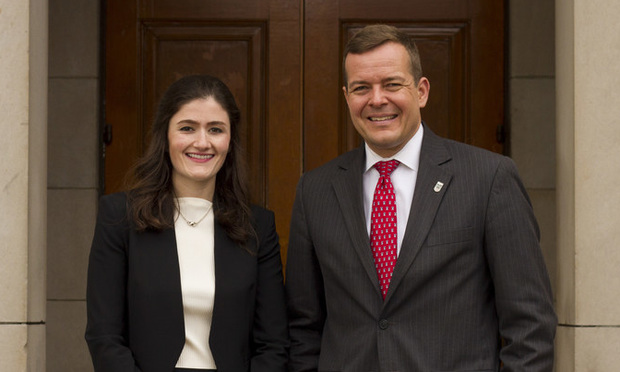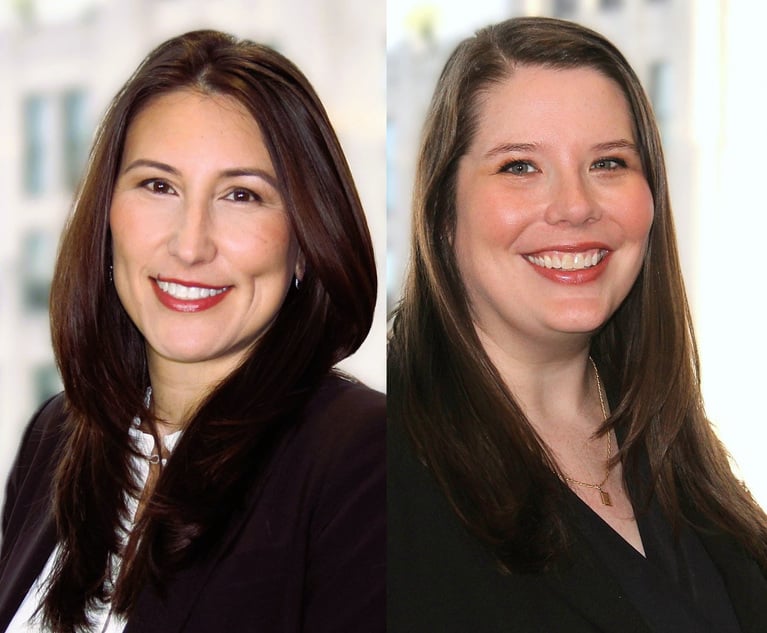$314M and Sovereign Immunity Are At Stake in Upcoming High Court Case
Even if the U.S. were amenable to accepting service at its foreign embassies, adherence to the Second Circuit's statutory interpretation could upend customary international law and the executive branch's reading of sovereign immunity.
November 01, 2018 at 11:58 AM
5 minute read
 Amanda Newton (left) and Dean Peter Rutledge, University of Georgia School of Law. (Photo: John Disney/ ALM)
Amanda Newton (left) and Dean Peter Rutledge, University of Georgia School of Law. (Photo: John Disney/ ALM)
The Nov. 7 Supreme Court arguments in Republic of Sudan v. Harrison will implicate issues of civil procedure, sovereign immunity, and statutory interpretation. At stake for the Republic of Sudan is $314 million in Sudanese assets. More broadly, however, the court's decision could have ramifications for any nation, including the United States, that enjoys sovereign immunity.
Issues related to international affairs occupy much of the court's attention. In this year's November sitting, the court will examine whether international organizations are owed sovereign immunity under the Foreign Sovereign Immunities Act. Last year, the court determined that foreign corporations could not be named in suits brought under the Alien Tort Statute and that the FSIA's terrorism exception does not provide a free-standing basis for parties to attach a foreign state's property in order to satisfy a judgment.
In Harrison, survivors of the 2000 bombing of the USS Cole filed suit under the FSIA, alleging that the Republic of Sudan provided material support to al-Qaida bombers. The FSIA generally prohibits lawsuits against foreign countries in U.S. courts, but excepts, among others, designated state sponsors of terrorism.
Service is proper under the FSIA if sent “to the head of the ministry of foreign affairs.” In Harrison, the clerk of the U.S. District Court for the District of Columbia served defendants by addressing the documents to the minister of foreign affairs and mailing them to the Sudanese Embassy in Washington
The district court found that the minister was properly served because the statute does not specify a particular location for service. On appeal, the U.S. Court of Appeals for the Second Circuit found that, although it was a “close call,” service through the embassy was sufficient because it “could reasonably be expected to result in delivery to the intended person.”
The Second Circuit's decision arguably conflicts with the decisions of its sister courts, which have found that a broad interpretation of the FSIA is inconsistent with Article 22 of the Vienna Convention on Diplomatic Relations. The VCDR provides that “the premises of the mission shall be inviolable” and that a “diplomatic agent shall … enjoy immunity from [the host state's] civil and administrative jurisdiction.” The Fourth and Seventh circuits determined that any attempt to serve a foreign entity through an embassy is prohibited by the VCDR.
By contrast, the Second Circuit in Harrison distinguished service on an embassy by mail from service on a minister of foreign affairs via an embassy, finding that the latter was consistent with the VCDR. The Second Circuit also found that acceptance of the documents by a mailroom clerk constituted “consent” under the VCDR.
Should the court accept the Second Circuit's broad statutory reading of the VCDR, the implications for the U.S. could be staggering. At any given time, the U.S. is represented in approximately 1,000 lawsuits in 100 different countries. The U.S. currently refuses to accept service through mail or personal delivery to a U.S. embassy.
Even if the U.S. were amenable to accepting service at its foreign embassies, adherence to the Second Circuit's statutory interpretation could upend customary international law and the executive branch's reading of sovereign immunity. U.S. courts have long strived to avoid violating foreign law if possible, and the State Department has found that creating a diplomatic mission in a foreign state did not empower that mission to act as an agent for service.
The bar should watch carefully for how much import the court places on the threat of reciprocal consequences. The court could weigh heavily the concerns of the United States, Libya, Saudi Arabia, and the UAE, all of which filed amicus briefs arguing that allowing service of process via an embassy would create “international discord.” The decision could ultimately affect not only how foreign entities are subjected to service abroad, but more generally how treaties and principles of international law are interpreted in a variety of international civil litigation contexts.
Peter B. “Bo” Rutledge is dean of the University of Georgia School of Law, where he holds the Herman Talmadge Chair of Law. A former clerk to Justice Clarence Thomas of the Supreme Court of the United States, Rutledge pursues teaching and research of international dispute resolution, arbitration, international business transactions and the U.S. Supreme Court.
Amanda W. Newton is a third-year law student and research clerkship and merit scholarship recipient at the University of Georgia School of Law. In addition to serving as a research assistant for the dean of the law school, she is a member of the executive board on the Journal of Intellectual Property Law, a representative on the Honor Court and a Dean's Ambassador.
This content has been archived. It is available through our partners, LexisNexis® and Bloomberg Law.
To view this content, please continue to their sites.
Not a Lexis Subscriber?
Subscribe Now
Not a Bloomberg Law Subscriber?
Subscribe Now
NOT FOR REPRINT
© 2025 ALM Global, LLC, All Rights Reserved. Request academic re-use from www.copyright.com. All other uses, submit a request to [email protected]. For more information visit Asset & Logo Licensing.
You Might Like
View All

CFPB Proposes Rule to Regulate Data Brokers Selling Sensitive Information
5 minute read
Trending Stories
- 1States Accuse Trump of Thwarting Court's Funding Restoration Order
- 2Microsoft Becomes Latest Tech Company to Face Claims of Stealing Marketing Commissions From Influencers
- 3Coral Gables Attorney Busted for Stalking Lawyer
- 4Trump's DOJ Delays Releasing Jan. 6 FBI Agents List Under Consent Order
- 5Securities Report Says That 2024 Settlements Passed a Total of $5.2B
Who Got The Work
J. Brugh Lower of Gibbons has entered an appearance for industrial equipment supplier Devco Corporation in a pending trademark infringement lawsuit. The suit, accusing the defendant of selling knock-off Graco products, was filed Dec. 18 in New Jersey District Court by Rivkin Radler on behalf of Graco Inc. and Graco Minnesota. The case, assigned to U.S. District Judge Zahid N. Quraishi, is 3:24-cv-11294, Graco Inc. et al v. Devco Corporation.
Who Got The Work
Rebecca Maller-Stein and Kent A. Yalowitz of Arnold & Porter Kaye Scholer have entered their appearances for Hanaco Venture Capital and its executives, Lior Prosor and David Frankel, in a pending securities lawsuit. The action, filed on Dec. 24 in New York Southern District Court by Zell, Aron & Co. on behalf of Goldeneye Advisors, accuses the defendants of negligently and fraudulently managing the plaintiff's $1 million investment. The case, assigned to U.S. District Judge Vernon S. Broderick, is 1:24-cv-09918, Goldeneye Advisors, LLC v. Hanaco Venture Capital, Ltd. et al.
Who Got The Work
Attorneys from A&O Shearman has stepped in as defense counsel for Toronto-Dominion Bank and other defendants in a pending securities class action. The suit, filed Dec. 11 in New York Southern District Court by Bleichmar Fonti & Auld, accuses the defendants of concealing the bank's 'pervasive' deficiencies in regards to its compliance with the Bank Secrecy Act and the quality of its anti-money laundering controls. The case, assigned to U.S. District Judge Arun Subramanian, is 1:24-cv-09445, Gonzalez v. The Toronto-Dominion Bank et al.
Who Got The Work
Crown Castle International, a Pennsylvania company providing shared communications infrastructure, has turned to Luke D. Wolf of Gordon Rees Scully Mansukhani to fend off a pending breach-of-contract lawsuit. The court action, filed Nov. 25 in Michigan Eastern District Court by Hooper Hathaway PC on behalf of The Town Residences LLC, accuses Crown Castle of failing to transfer approximately $30,000 in utility payments from T-Mobile in breach of a roof-top lease and assignment agreement. The case, assigned to U.S. District Judge Susan K. Declercq, is 2:24-cv-13131, The Town Residences LLC v. T-Mobile US, Inc. et al.
Who Got The Work
Wilfred P. Coronato and Daniel M. Schwartz of McCarter & English have stepped in as defense counsel to Electrolux Home Products Inc. in a pending product liability lawsuit. The court action, filed Nov. 26 in New York Eastern District Court by Poulos Lopiccolo PC and Nagel Rice LLP on behalf of David Stern, alleges that the defendant's refrigerators’ drawers and shelving repeatedly break and fall apart within months after purchase. The case, assigned to U.S. District Judge Joan M. Azrack, is 2:24-cv-08204, Stern v. Electrolux Home Products, Inc.
Featured Firms
Law Offices of Gary Martin Hays & Associates, P.C.
(470) 294-1674
Law Offices of Mark E. Salomone
(857) 444-6468
Smith & Hassler
(713) 739-1250







